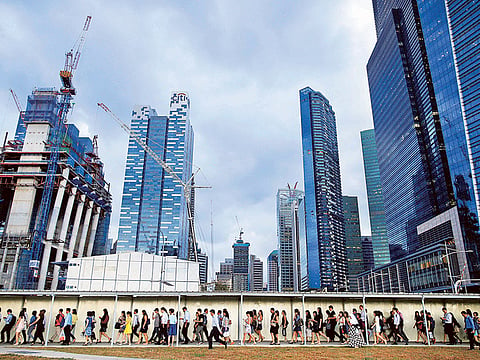Singapore dodges technical recession, grows 1.8% in 2016
Analysts warned growth in 2017 could even be more subdued if rising protectionism crimps global trade

SINGAPORE: Singapore’s trade-driven economy grew 1.8 per cent last year, the slowest pace since the global financial crisis in 2009, after dodging a technical recession in the fourth quarter, official data showed on Tuesday.
Analysts warned growth in 2017 could even be more subdued if rising protectionism crimps global trade and further rises in US interest rates put more pressure on the local economy.
“Singapore has comfortably dodged a technical recession in Q4 2016, but we expect the local economy to remain in ‘slow-mo’,” said Weiwen Ng, Southeast Asia economist at banking group ANZ.
“The prospects of a more protectionist trade policy poses headwinds to Singapore’s economy who is still wedded to the old export-led growth model,” Ng said in a note.
There have been concerns among Asia’s export-driven economies about rising protectionism in the West, where globalisation and free-trade deals have been blamed for sending jobs abroad and opening the floodgates to immigrants.
Donald Trump, who will be sworn in US president on January 20, has vowed to tear up the Trans-Pacific Partnership (TPP), a major trade deal negotiated by outgoing President Barack Obama.
Singapore is a key member of the 12-nation TPP which contains market-opening provisions that go well beyond cutting tariffs.
Singapore’s trade ministry said on Tuesday that the city-state’s economy expanded 9.1 per cent quarter-on-quarter in the three months to December, reversing a 1.9 per cent contraction the previous quarter.
A technical recession refers to two straight quarters of quarter-on-quarter contractions.
Last year’s growth is below the 2.0 expansion in 2015.
“The big picture is that Singapore’s growth looks set to remain weak over the next couple of years against a backdrop of tightening domestic monetary conditions,” said Capital Economics’ regional economist Krystal Tan.
Recovery in exports seems “unlikely” as global growth is expected to be lacklustre in the coming years, Tan said in a research note.
“Moreover, there remain significant downside risks to global trade, notably a turn towards protectionism in the US,” she said.
Sign up for the Daily Briefing
Get the latest news and updates straight to your inbox


